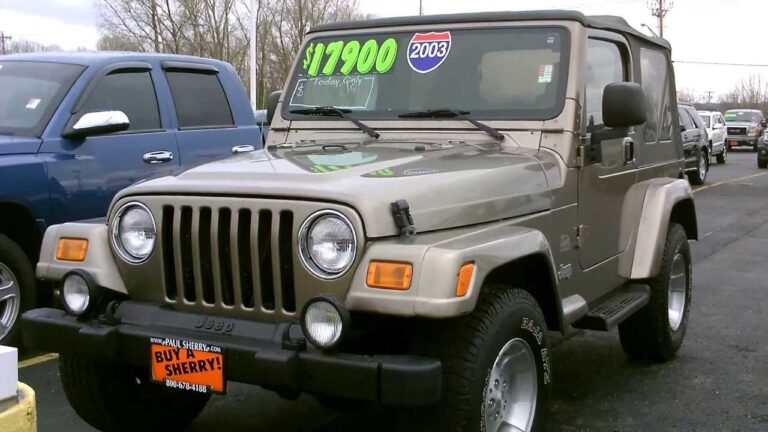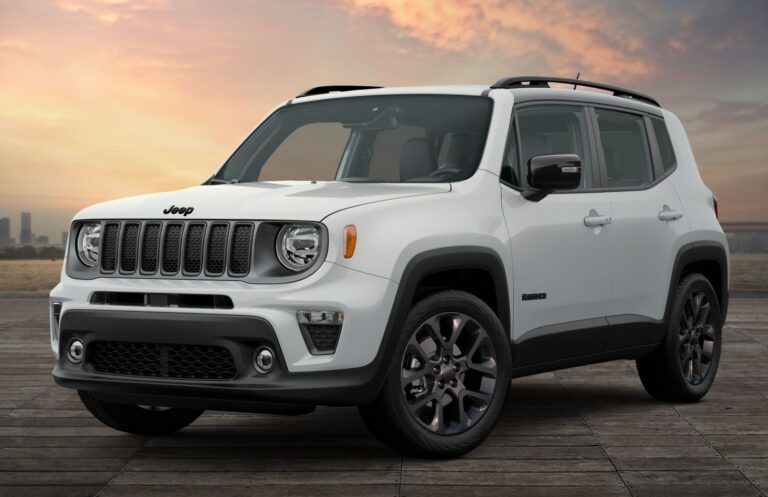Jeep 258 Crankshaft For Sale: Your Comprehensive Guide
Jeep 258 Crankshaft For Sale: Your Comprehensive Guide jeeps.truckstrend.com
The iconic Jeep 258 cubic inch (4.2L) inline-six engine is a cornerstone of American automotive history, powering countless Jeeps, AMC vehicles, and even some International Harvester models from the 1970s through the early 1990s. Renowned for its torque, simplicity, and rugged durability, it has become a favorite among off-road enthusiasts and classic Jeep restorers alike. At the heart of this legendary engine lies its crankshaft – the critical component that transforms the pistons’ linear motion into the rotational power that drives your vehicle.
When you’re dealing with an engine as venerable as the 258, the need for a Jeep 258 crankshaft for sale often arises. Whether you’re undertaking a full engine rebuild, repairing catastrophic damage, or even planning a performance upgrade like a "stroker" conversion, finding the right crankshaft is paramount. This comprehensive guide will delve into everything you need to know about acquiring a Jeep 258 crankshaft, ensuring you make an informed decision for your beloved classic.
Jeep 258 Crankshaft For Sale: Your Comprehensive Guide
Understanding the Jeep 258 Engine and Its Crankshaft
The AMC 258 engine is a long-stroke, inline-six workhorse known for its low-end torque. Its design emphasizes reliability and longevity, making it ideal for the demanding conditions Jeeps often face. The crankshaft is the backbone of this engine, connecting the pistons via the connecting rods and transferring their power to the flywheel and ultimately the transmission. It’s a precisely machined component, subject to immense rotational and bending forces.
Over decades of service, even the most robust crankshafts can experience wear or damage. Common issues that necessitate a Jeep 258 crankshaft for sale search include:
- Journal Wear: The surfaces where the connecting rods and main bearings ride can wear down, become out-of-round, or develop scoring.
- Cracks: High stress, lack of lubrication, or catastrophic engine failure can lead to cracks, often invisible to the naked eye without specialized inspection.
- Bending/Twisting: Severe engine events (e.g., hydro-lock, broken connecting rod) can physically deform the crankshaft.
- Spun Bearings: When bearings seize and spin on the crankshaft journals, they cause severe damage to the journal surface, often requiring significant grinding or replacement.

For any of these reasons, a replacement or reconditioned crankshaft becomes a crucial item on your parts list.
Why Are You Seeking a Jeep 258 Crankshaft For Sale? Common Scenarios
Before embarking on your search for a Jeep 258 crankshaft for sale, it’s helpful to understand the primary reasons people look for them. This can help define the type and condition of crankshaft you need.
- Standard Engine Rebuild/Restoration: If your 258 is just tired, worn out, or being restored to original specifications, you might need a crankshaft that’s either in excellent used condition, remanufactured to standard specs, or can be ground to a common undersize.
- Repairing Catastrophic Engine Failure: A thrown rod, spun bearing, or other severe internal damage often means the original crankshaft is beyond repair. In such cases, a replacement is essential.
- Performance Upgrade (Stroker Build): Many enthusiasts "stroke" their 258 engines, often using a crankshaft from an AMC 4.0L engine (with modifications) or a custom aftermarket crankshaft, to increase displacement and torque. While this article focuses on the 258 crankshaft specifically, it’s a common reason for engaging with crankshaft suppliers.
- Replacing a Damaged or Unserviceable Component: Sometimes, a crankshaft is simply too worn or damaged to be effectively reground, making a replacement the only viable option.
Types and Categories of Jeep 258 Crankshafts Available
When looking for a Jeep 258 crankshaft for sale, you’ll encounter several categories, each with its own pros and cons regarding cost, quality, and availability.
- New Aftermarket Crankshafts:
- Pros: Brand new, never used, often made from improved materials or with better manufacturing processes than original. No prior wear or damage.
- Cons: Can be expensive, and true new 258 crankshafts are becoming increasingly rare, with many "new" ones actually being remanufactured.
- Remanufactured/Reconditioned Crankshafts:
- Pros: Cost-effective alternative to new. These have been professionally inspected, magnafluxed for cracks, ground to undersize specifications (e.g., .010", .020", .030"), and polished. They come ready for installation with matching undersized bearings. Often carry a warranty.
- Cons: Have been previously used and ground. Quality can vary between rebuilders. You need to ensure the grinding work is precise.
- Good Used/Salvage Crankshafts:
- Pros: The cheapest option. Can be a good find if you know what to look for and have access to a reputable machine shop for inspection.
- Cons: Highly variable condition. May have wear, scoring, or hidden cracks. Requires professional inspection, magnafluxing, and likely grinding, adding to the total cost. "As-is" sales carry significant risk.
- Forged vs. Cast Crankshafts:
- Most stock 258 crankshafts were cast iron. This is sufficient for stock power levels.
- Forged steel crankshafts are stronger and more durable, better suited for high-performance or forced induction applications. While less common for a direct 258 replacement, some aftermarket options or custom builds might utilize forged steel. If durability is your top priority, inquiring about the material is crucial.
Key Considerations When Evaluating a Jeep 258 Crankshaft For Sale
Choosing the right Jeep 258 crankshaft for sale involves careful evaluation. Here are the critical factors to consider:
- Condition:
- Visual Inspection: Look for deep scoring, pitting, or visible cracks on the journals and counterweights.
- Magnafluxing: This is non-negotiable for any used crankshaft. A machine shop uses magnetic particles to reveal even microscopic cracks. Do not buy a used crankshaft that hasn’t been magnafluxed.
- Straightness: A crankshaft can warp or bend. This needs to be checked by a machine shop.
- Measurements (Journal Sizes):
- Main and rod journals wear down. When they are reground, they are cut to a smaller "undersize" (e.g., -0.010", -0.020", -0.030").
- Crucially, know what size bearings you intend to use. If you buy an undersized crank, you need corresponding undersized bearings. If you buy a standard size crank, ensure it actually is standard and not just advertised as such.
- Always verify journal dimensions with a micrometer, or have a machine shop do it.
- Balancing:
- A crankshaft must be precisely balanced to prevent excessive vibration and premature wear on bearings and other engine components.
- If you’re replacing a crankshaft, especially if you’re mixing and matching components (e.g., different pistons or rods), it’s highly recommended to have the rotating assembly (crankshaft, connecting rods, pistons, harmonic balancer, flywheel/flexplate) professionally balanced as a unit.
- Casting Numbers/Identification:
- While less critical for a direct 258 replacement, knowing the casting numbers can help verify the crankshaft’s origin and year, ensuring compatibility.
- Be aware that 258 and 4.0L crankshafts are physically different (stroke length). Ensure you’re getting a true 258 crankshaft if that’s what you need, or the correct 4.0L crank if you’re planning a stroker.
Where to Find a Jeep 258 Crankshaft For Sale
The search for a Jeep 258 crankshaft for sale can take you to several different sources:
- Specialized Aftermarket Engine Parts Suppliers: Companies that specialize in older engine components or remanufactured engines are often the best bet for reliable remanufactured crankshafts. They usually offer warranties and stand behind their products. Examples include Northern Auto Parts, Summit Racing (though less common for old cranks), and local engine rebuilders.
- Online Marketplaces (eBay, Facebook Marketplace, Forums):
- Pros: Wide selection, potential for good deals on used parts.
- Cons: High risk. You’re often buying "as-is" from individuals. Thorough vetting, asking for detailed photos/videos, and arranging professional inspection upon arrival are essential.
- Jeep Enthusiast Forums & Communities: Websites like JeepForum.com, NAXJA.org (for XJ Cherokee fans), and dedicated AMC/Jeep groups on Facebook often have "parts for sale" sections where members might be selling good used components. This can be a great source for community-vetted sellers.
- Salvage Yards/Junkyards:
- Pros: Potentially very cheap. If you’re lucky, you might find a low-mileage engine that can yield a good core.
- Cons: Condition is a huge gamble. You’re buying blind, and the crankshaft will almost certainly need a full professional inspection and likely grinding.
- Local Engine Rebuilders/Machine Shops: Many machine shops keep a stock of common crankshafts, either cores or already reconditioned. They can also source one for you and ensure it’s properly prepared. This is often the most reliable route, as they can also perform the necessary inspection and machining services.
Practical Tips for Purchasing Your Jeep 258 Crankshaft
To ensure a successful purchase of a Jeep 258 crankshaft for sale, follow these actionable insights:
- Do Your Homework: Understand the different types and what you specifically need (standard, undersized, condition).
- Ask Detailed Questions: For used or remanufactured cranks, inquire about its history (if known), what size the journals are ground to, if it’s been magnafluxed, and if it comes with any warranty.
- Request High-Resolution Photos/Videos: For online purchases, demand clear, detailed images from multiple angles, especially of the journals.
- Verify Seller Reputation: Check reviews, ask for references, or engage with sellers who are active and respected within Jeep communities.
- Factor in Shipping Costs and Insurance: Crankshafts are heavy. Shipping can be expensive. Always insure the shipment.
- Budget for Professional Inspection/Machining: Unless you’re buying a brand-new, ready-to-install unit, assume any purchased crankshaft will need to be inspected, magnafluxed, measured, and potentially ground by a reputable machine shop before installation. This cost is part of the overall project.
- Consider a Warranty: If buying a remanufactured unit, ensure it comes with a clear warranty.
Challenges and Solutions in Your Search
Finding the perfect Jeep 258 crankshaft for sale isn’t always straightforward. Here are common challenges and how to overcome them:
- Scarcity of New Parts: As these engines age, new parts become harder to find.
- Solution: Focus on reputable remanufactured units or thoroughly inspected good used cores.
- Identifying Genuine vs. Misrepresented Items: Some sellers may mislabel parts or be unaware of specific details.
- Solution: Know your casting numbers, ask for precise measurements, and rely on professional inspection.
- Shipping Damage: Heavy, fragile parts can be damaged in transit.
- Solution: Ensure the seller uses robust packaging, and always opt for shipping insurance. Inspect the package immediately upon arrival before signing off.
- Cost vs. Quality: The cheapest option isn’t always the best. A "bargain" used crank that requires extensive machining or turns out to be cracked will cost more in the long run.
- Solution: Balance your budget with the need for a reliable, usable component. Prioritize professional inspection.
Installation and Beyond
Once you’ve secured your Jeep 258 crankshaft for sale, the journey isn’t over. Proper installation is critical for engine longevity.
- Professional Installation Recommended: Unless you have extensive engine building experience, it’s highly advisable to have a qualified engine builder or mechanic install the crankshaft. This involves precise torque specifications, correct bearing clearances, and careful assembly.
- Associated Parts: Don’t forget necessary accompanying components: new main bearings, rod bearings, thrust washers, seals (front and rear main), and possibly new connecting rod bolts.
- Full Engine Rebuild: Replacing the crankshaft often signals the need for a more comprehensive engine rebuild. Consider refreshing other components like pistons, rings, camshaft, lifters, oil pump, and timing chain for a truly reliable and long-lasting engine.
Sample Price Table: Jeep 258 Crankshaft For Sale (Estimated Ranges)
Please note: Prices are highly variable based on condition, seller, location, brand (for new/reman), and market demand. These are estimated ranges for guidance only. Always get current quotes.
| Crankshaft Type/Condition | Estimated Price Range (USD) | Key Notes |
|---|---|---|
| New Aftermarket | $600 – $1,200+ | Rare; often limited availability. May be "new old stock" or recently manufactured. |
| Remanufactured/Reconditioned | $350 – $700 | Professionally ground to undersize (e.g., .010", .020", .030"). Comes ready for installation with matching bearings. Often warrantied. |
| Good Used (Inspected/Magnafluxed) | $150 – $300 | Must be verified by a machine shop. Likely requires grinding to undersize. "Good core" for rebuild. |
| Used (As-Is/Core) | $50 – $150 | High risk. Unknown condition. Will almost certainly require full inspection, magnafluxing, and grinding. |
| Aftermarket Forged (Performance) | $1,000 – $2,500+ | Primarily for stroker builds or high-performance applications. May require custom work. |
Disclaimer: These prices are illustrative and do not constitute a binding offer. Always verify current pricing and availability with specific vendors. Additional costs for shipping, professional inspection, balancing, and machining will apply.
Frequently Asked Questions (FAQ) about Jeep 258 Crankshafts
Q1: Can I use a 4.0L crankshaft in a 258 engine?
A1: Yes, this is a common modification for a "stroker" build. The 4.0L crankshaft has a longer stroke, increasing the 258’s displacement to approximately 4.6L or 4.7L. However, it’s not a direct swap; it requires custom connecting rods, specific pistons, and often block clearancing.
Q2: What’s the difference between a cast and forged crankshaft?
A2: Cast crankshafts are formed by pouring molten metal into a mold. They are generally less expensive and suitable for stock power levels. Forged crankshafts are formed by hammering or pressing solid steel, resulting in a denser, stronger, and more durable component, ideal for high-performance or heavy-duty applications. Most stock 258 cranks are cast.
Q3: How do I know if my crankshaft needs to be replaced or just reground?
A3: A professional machine shop can determine this. If the journals have light scoring or wear, they can often be "ground" to a smaller, precise undersize. If there are deep gouges, cracks, or significant bending/twisting, replacement is usually necessary as there isn’t enough material to safely regrind.
Q4: What are main and rod journal sizes?
A4: These refer to the diameter of the surfaces where the main bearings (supporting the crankshaft in the block) and connecting rod bearings (connecting the rods to the crankshaft) ride. When these journals are worn, they are ground down to precise, smaller "undersizes" (e.g., .010", .020", .030" less than standard), requiring correspondingly sized bearings.
Q5: Is balancing the crankshaft necessary?
A5: Yes, balancing is crucial. An unbalanced crankshaft can cause excessive vibration, leading to premature wear on bearings, engine mounts, and other components, reducing engine life and performance. For any new or used crankshaft installation, especially if other rotating components are changed, professional balancing of the entire rotating assembly is highly recommended.
Conclusion: The Enduring Legacy of the 258
The search for a Jeep 258 crankshaft for sale is more than just finding a part; it’s an investment in the continued life of a legendary engine. With its robust design and enduring appeal, the AMC 258 continues to power countless adventures. By understanding the types of crankshafts available, knowing where to look, and carefully considering key factors like condition, measurements, and professional inspection, you can ensure your classic Jeep or AMC vehicle continues to deliver reliable performance for many more miles and trails to come. Embrace the journey of restoration, and your 258 will reward you with years of faithful service.





